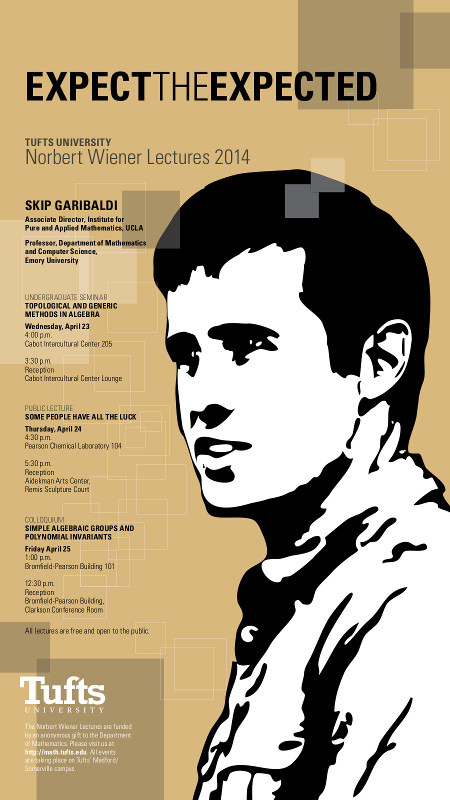Skip Garibaldi gave the Wiener Lectures in the Tufts University Math Department in April 2014.
Some people have all the luck (public lecture)
Abstract: Winning a prize of at least $600 in the lottery is a remarkable thing - for a scratcher ticket the odds are worse than 1-in-1200 and 1-in-9000 is a more typical figure. Some people have won many of these large prizes, and clearly they are very lucky or they buy a ton of lottery tickets. When we investigated records of all claimed lottery prizes, we discovered that some people had won hundreds of these prizes! Such people seem to be not just lucky, but suspiciously lucky. I will explain what we thought they might have been up to, what mathematics says about it, and what further investigations revealed. This talk is about joint work with Lawrence Mower, an investigative reporter for the Palm Beach Post, and Philip B. Stark, professor and chair of the UC Berkeley Department of Statistics.
Topological and generic methods in algebra (math major lecture)
Abstract: In calculus we take limits and think about graphs all the time, and it would be nice to be able to use the same sorts of techniques in courses like abstract linear algebra and abstract algebra, even when you aren’t working with real or complex numbers. I’ll explain how these techniques can be used and give some examples of their application.
Simple algebraic groups and polynomial invariants (colloquium lecture)
Abstract: The classical “linear preserver problem” asks: Given a polynomial in finitely many variables, what is the group of linear transformations that preserve it? This problem has been solved for many interesting polynomials, usually by means that are special to the particular polynomial under consideration. We turn this problem on its head by starting with a polynomial that is preserved by a simple algebraic group and observe that the full preserver can be described by a general theorem. The results are new even in the case where the field is the complex numbers, and as an application we shed some light on a 125+ year old problem. This is joint work with Bob Guralnick.
